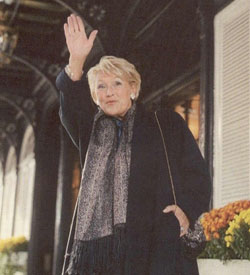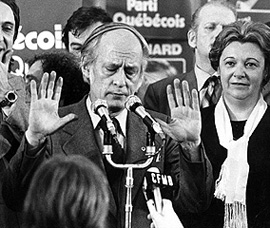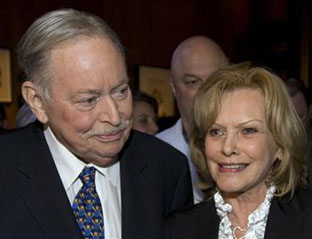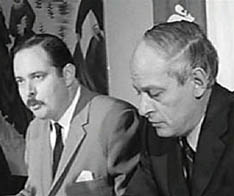Who’s afraid of Pauline Marois : or why does Québec still have more people who call themselves Canadian than any other province in Canada?
May 18th, 2010 | By Randall White | Category: Canadian Provinces
Pauline Marois at the Ritz-Carlton Montréal, 1228 Sherbrooke Street West, 2007, not long after she became leader of the Parti Québécois, and Leader of the Official Opposition of the National Assembly of Québec.
In Drummondville, Québec over the past weekend “Parti Québécois leader Pauline Marois … drew a parallel between her party’s goal of making Québec a sovereign country and the Montréal Canadiens’ quest for the Stanley Cup. ‘The whole nation is vibrating in tune with a team of players who were called too small, not talented enough, not proud enough to win.’”
All this would be more impressive if the team were called the Montréal Québécois. But it is called “Le Canadien.” And that is one great problem of any serious Québec independence movement – as many of us who have been watching this often interesting enough sideshow from a distance since the 1960s have gradually come to appreciate.
Take, eg, a related case in point that we seldom make much of (and I often wonder why?). Further back in time it was officially impossible to give “Canadian” (or “Canadien”) as your “ethnic origin” in the Census of Canada. In the more recent past what René Lévesque used to call the colonized mind has at least made it over this hurdle. And it is now possible to report Canadian as your ethnic origin, when asked by Statistics Canada.
So … take the most recent 2006 census. If you rank the 10 provinces according to “Canadian single and multiple ethnic origin responses” as a percentage of “total single and multiple ethnic origin responses” here is what you get: Québec – 60.2% ; New Brunswick – 52.9% ; Newfoundland and Labrador – 48.2% ; Nova Scotia – 40.9% ; Prince Edward Island – 39.0% ; Ontario – 23.0% ; Alberta – 20.5% ; Manitoba – 18.2% ; Saskatchewan – 18.1% ; British Columbia – 17.7%. (Oh, and btw, you might also wonder: just what percentage of Québec single and multiple ethnic origin responses report themselves as “Québécois”? This number was as low as 1.9% in 2006!)
You might of course say that this distribution of self-reported Canadian ethnic origins by province just reflects some parallel distribution of immigrants by province. Ie, the provinces with the highest percentages of “Canadians” are also those with the lowest percentage of immigrants. There is in fact something to this, but it is far from the whole picture. Consider, eg, this distribution of immigrants as percentages of total provincial populations in the 2006 census: Ontario – 28.2% ; British Columbia – 27.5% ; Alberta – 16.2% ; Manitoba – 13.3% ; Québec – 11.5% ; Saskatchewan – 5.0% ; Nova Scotia – 5.0% ; New Brunswick – 3.7% ; Prince Edward Island – 3.6% ; Newfoundland and Labrador – 1.7%.

An already somewhat harassed new Québec Premier René Lévesque tries to calm supporters at Parti Québécois rally in Montréal, following his party's first Québec election victory, November 15, 1976.
In other words, eg, Québec has a higher percentage of immigrants in its population than five of today’s 10 Canadian provinces, but it still also has the highest percentage of residents reporting Canadian (or Canadien) ethnic origins of all 10 provinces. Ontario has the highest percentage of immigrants of all 10 provinces, but it still also has a higher percentage of residents reporting Canadian ethnic origins than four other provinces. Alberta has both a higher percentage of immigrants and a higher percentage of residents reporting Canadian ethnic origins than Saskatchewan. Nova Scotia has both a higher percentage of immigrants and a higher percentage of residents reporting Canadian ethnic origins than Prince Edward Island, etc, etc, etc.
What all this suggests, I would submit without too much caution, is something like this:
If and when the Parti Qu̩b̩cois of Pauline Marois or anyone else does (once again) become the provincial government of the Qu̩bec that is not now and never will be a province like the others, the larger Canada which is also a home to all the self-reported Canadiens in Qu̩bec (and fabled Montr̩al Canadiens) is not really going to fall off the edge of the cliff below the Plains of Abraham Рany more than it has in the past 42 years since Ren̩ L̩vesque founded the Parti Qu̩b̩cois (in the same year that Pierre Trudeau first became prime minister of Canada).

Jacques Parizeau, Parti Québécois Premier of Québec, 1994—1996, and his wife Lisette Lapointe at a book launch in Montréal, November16, 2009.
This is not at all to say that I think we should write off “Québec sovereignty” as a spent and insignificant force. I think it is an established fact of life under any Québec provincial government, including the presently somewhat troubled Liberal regime of Jean Charest.
At some point I think we should even spell out what this means in our constitution – at the same time as we reform our federal Senate at last, spell out just how proud we are of our aboriginal constitutional origins, provide for some suitably polite end to the obsolete symbolism of the British monarchy in Canada, and so forth. Meanwhile, we have at least learned from the past 42 years that there are good enough reasons for not worrying unduly about the future of “Canada and Québec.” And the Montréal Canadiens is one of them – regardless of how they do in 2010 against the Flyers from the city that gave the USA today its present constitution, back in the mists of some time we have almost all forgotten now.


Awesome point of view. Will visit again. Cheers
I just found this article while discovering this great magazine. As a Quebecker and a researcher in the public opinion field, I can’t help but to comment this article even if it was written in may 2010!
The main argument in the text is based on the “self identification” of Québec residents in Statistic Canada census. The thesis of the article is that, while still being an important political force in Québec, the separatist movement is overestimated since Québec residents are more prone to self identify themselves as “Canadians” than any other people in Canada.
I would argue that in Statistic Canada census, one cannot choose « Québécois » as an ethnic (or national) origin. It is of course possible to choose the category “other” and write down “Québécois”. Then, following Statistic Canada census methods, if a sufficient number of people identify themselves in such a category, it will be added as an “official choice” in the next census. So, while answering this question, I would argue that most Québec citizens answer in a “practical” manner. In a Québec survey, if you ask a question like this one : “Would you say that you are Québécois first and Canadian in second, Canadian first and Québécois in second, or both are equal to you ? » you will have results that show that french speaking citizens in Québec identify themselves as Québécois first in 70% to 85% of the cases.
As for the Montréal Canadians, I would remember the author that the club was originally intended to reach the market of french speaking people in the province by providing them a club with which they could identify themselves with as oppose to the Montréal Maroons which was intended to the english speaking hockey fans. At the time, for most french speaking people, the term “Canadien” was still closely linked to being french speaking. As Canada evolved and english adopted the term “Canadian”, french speaking people felt the need to express their difference as a group and adopted the term “Canadiens français”, a term which is still commonly used by senior french speaking people in Québec but seems obsolete since the Quite revolution and the wide adoption of term “Québécois” for most french speaking people in Québec (which unfortunately exclude all french speaking Canadiens who are not in Québec).